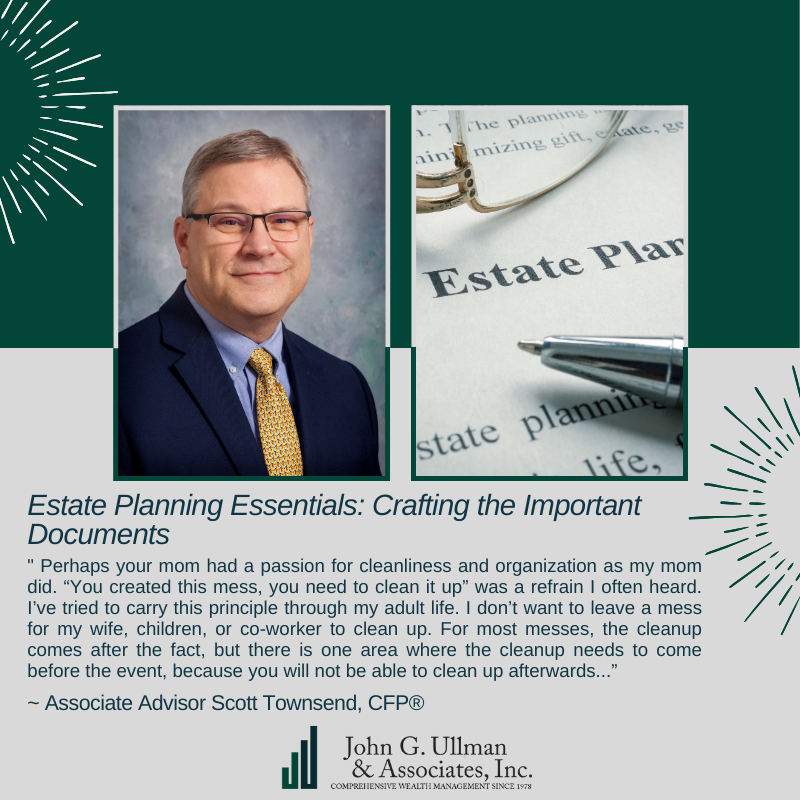Perhaps your mom had a passion for cleanliness and organization as my mom did. “You created this mess, you need to clean it up” was a refrain I often heard. I’ve tried to carry this principle through my adult life. I don’t want to leave a mess for my wife, children, or co-worker to clean up. For most messes, the cleanup comes after the fact, but there is one area where the cleanup needs to come before the event, because you will not be able to clean up afterwards.
There is coming a time for each of us when this physical body will begin to fall apart and eventually cease to function all together. I know of a family that faced such a mess. A young couple and their infant son were passengers in a vehicle crash. Both mom and dad died in the crash, leaving the infant son an orphan. Because the couple had no Will, the grandparents were at a loss about who would raise the child. This is the kind of mess I’m talking about. It can be avoided with proper preparation. Will you leave a mess for your family or friends to clean up or will you prepare ahead of time? The way to make sure you don’t leave a mess behind is to have estate documents prepared and in a location where your family can access them.
First of all, we need to put away the notion that estate documents are only for old people with lots of money. The reality is that none of us know our expiration date. I can demonstrate my love for my family by preparing ahead of time and relieving them of the burden of trying to figure out my wishes. Proper estate documents also assure that the decisions are mine and not the government’s. So what exactly are estate documents? They are the documents that express your wishes when you become incapacitated or when you die.
The most important of these documents and the one most people are familiar with is a Will. The Will states what happens to your assets and possession after you die. It is also where you give instructions on the care of your spouse and minor children. You will name an Executor/Executrix who will follow the details of the Will. You will also name guardians for minor children.
A Trust is created to protect or provide for a person or cause. Assets placed into a Trust are used for a minor child, a spouse, a special needs individual, or a cause that is important to you. Trusts can be created as standalone documents, or your Will may give instructions to set up a trust with some of your assets.
A Power of Attorney (POA) is your instruction to have someone make financial decisions about your affairs if you are incapacitated or unable to make the decisions yourself. A durable POA goes into effect when signed. A springing POA goes into effect when some future event, like your disability, takes place. Durable POAs tend to be easier for your relatives to use.
A Medical Power of Attorney contains your instructions for someone to make medical decisions on your behalf. Make sure your Medical POA has a HIPAA release (Health Insurance Portability and Accountability Act). This will allow your designated POA to have access to your medical records. It is also important for a parent to have their children sign a Medical POA when they turn 18. My wife and I learned this the hard way when our newly turned 18 year old son had an allergic reaction. The doctors and nurses ignored us and would only deal with “the adult”.
While not a legal document, it would also be a good idea to create an outline for your family stating your wishes concerning your remains and whether or not you want a funeral or memorial service.
While there are online resources you can turn to for these documents, it is best to have an attorney who specializes in estate planning to draft the documents for you to review and sign. That way you will be sure the documents are legal for the state you live in. You will want to give careful consideration to the people you name in your estate documents. The Executor/Executrix, Trustee, Guardian, POA and contingents should all be people who know and understand you and your wishes. They also need to be people you have great confidence and trust in because you are asking them to take on an important responsibility. Additionally, this is a good time to check that you have named beneficiaries on all your financial accounts, especially retirement accounts.
One of the peculiarities of human nature is a reluctance to get estate documents completed. Perhaps it is an irrational fear that if I get them done my death is now imminent. Put away the fear and procrastination and get this task done. Your JGUA advisor would be happy to walk you through the process.







